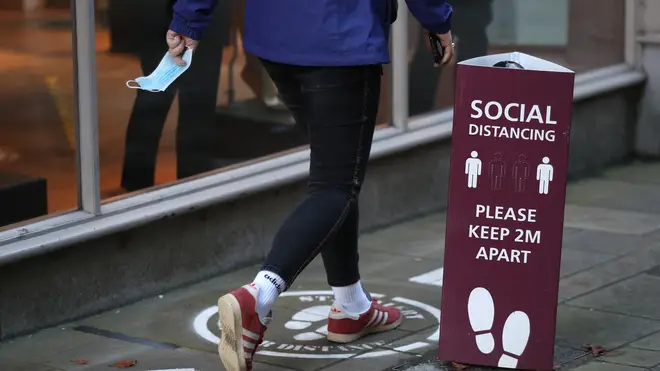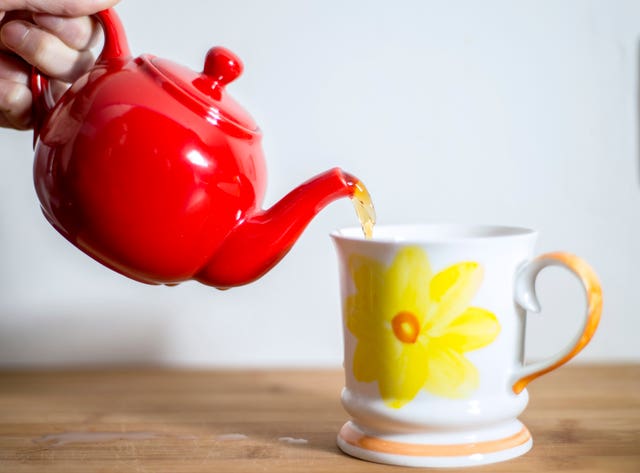
Ian Payne 4am - 7am
20 November 2020, 00:04

Despite the downward spending trend, sales of tea and alcohol appear to have been boosted during lockdown, according to Mintel.
Consumer spending will have shrunk by £6,600 per household on average this year compared with 2019, analysis suggests.
In total, UK consumer spending is expected to have fallen by £183.6 billion, or 14.9%, due to the Covid-19 induced lockdowns, Mintel’s British lifestyles report said.
Bucking the downward spending trend, the research found evidence that sales of tea and alcohol have been boosted as people have swapped going out for staying in.
In general, Mintel anticipates a long path to recovery, predicting consumer spending will not recover to pre-pandemic levels until at least 2023.
Jack Duckett, Mintel associate director of consumer lifestyles research, said: “Although consumer spending will recover from this year’s astonishing £180 billion drop, it will undoubtedly be a long path to recovery: Mintel forecasts suggest that pre-Covid levels will not return until 2023 at the earliest.”
More than three-quarters of this year’s spending decline relates to the transport, food service and holiday industries, Mintel said.
Consumer spending on these three categories alone will have fallen by £140.1 billion in total during 2020 – or just over £5,000 per household, the research found.
More positively, Mintel said these categories should experience the strongest bouncebacks in 2021.
It predicts that spending on transport will increase by £32.3 billion compared with 2020, spending on food services will rise by £17.7 billion, and holidays will get a £19.2 billion boost.
The predictions would represent an increase in spending of just under £2,500 per household.

Some spending categories have already been boosted this year.
Mintel said the three sectors that will experience the biggest increase in consumer spending this year – equating to just over £400 per household – are food, alcoholic, and non-alcoholic drinks purchased at “retail channels”, such as supermarkets, and consumed at home.
While the lockdown may have encouraged some people to bring forward “wine o’clock”, when they uncork a bottle of wine or open a beer, there is also evidence that the pandemic has revived the fortunes of tea.
Mintel said sales of tea and other hot drinks are forecast to have increased by 7% this year, following five years of lacklustre sales.
The in-home coffee market is also expected to have grown by 13% in value terms this year.
Last year, sales of hot drinks totalled £779 million, with tea accounting for over 80% of the total. This year, hot drinks sales are estimated by Mintel to total £830 million.
Mr Duckett said: “We estimate that retail value sales of alcoholic drinks will grow 16% year-on-year – the fastest growth rate experienced for at least a decade – to reach £25.5 billion in 2020, as people trade nights out for evenings in.
“In particular, the current recession opens up opportunities for premium own-label drinks to grow in popularity.”
He added: “The growth in the size of the older population over the next five years, and the fact that they are most likely to be insulated from the financial impact of the pandemic, makes targeting the ‘grey pound’ particularly timely for all brands including alcoholic drinks.
“A long heritage, being aged for longer, not being mass-produced, and extra care in production are all factors that feed into over-55s’ perception of what makes an alcoholic drink premium.”
The report also suggests that younger adults will play a significant role in supporting the recovery of the airline industry.
Mr Duckett said: “Although the number of flights isn’t expected to return to pre-Covid levels in the next five years, an increase in the average cost per trip should see airlines’ market value return to 2019 levels by 2025.
“It’s the younger generation who’ll lead the recovery of travel by plane as 16 to 34-year-olds have been the most confident in booking flights since Covid-19 hit: 25% in this age group would feel somewhat or extremely comfortable taking a flight, compared to only 14% of over-55s.”
He added: “Airlines and public transport are among the sectors worst affected by Covid-19 and will be among the last to fully recover.
“Prior to the pandemic, commuting accounted for around a third (30%) of all public transport journeys, and while demand for public transport will return once people feel safe, there’s likely to be a permanent decline in commuting as flexible working becomes the norm.”
Here are the top three categories where spending is expected to have fallen most in 2020, according to Mintel, with the total fall, the fall per household and the percentage change compared with 2019:
1. Transport, £55.1 billion, £1,982, fall of 29.6%
2. Food services, £44.3 billion, £1,593, fall of 57.8%
3. Holidays, £40.7 billion, £1,462, fall of 70.3%
And here are the top three categories where spending is expected to have increased most per household in 2020, according to Mintel, with the total increase, the increase per household and the percentage change compared with 2019:
1. Food, £6.9 billion, £249, increase of 8.1%
2. Alcoholic drinks, £3.6 billion, £129, increase of 16.3%
3. Non-alcoholic drinks, £700 million, £24, increase of 5.7%